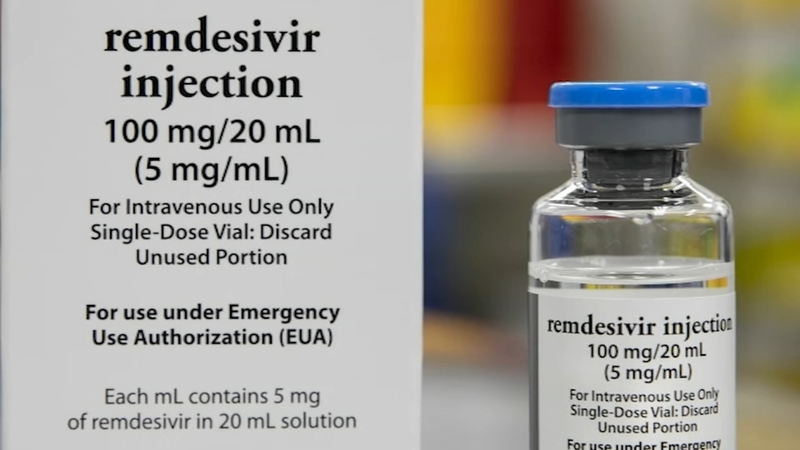The use of Remdesivir (Investigational) to treat hospitalized patients with COVID-19

Remdesivir
The broad-spectrum antiviral agent remdesivir is a nucleotide analog prodrug. On May 1, 2020, The FDA has granted an emergency use authorization (EUA) for remdesivir to treat hospitalized adults and children with suspected or laboratory-confirmed SARS CoV-2 infection and severe COVID-19 disease.
MANDATORY REQUIREMENTS FOR REMDESIVIR ADMINISTRATION UNDER EMERGENCY USE AUTHORIZATION:
Use of unapproved remdesivir under this EUA is limited to the following (all requirements must be met):
- Treatment of suspected or laboratory confirmed coronavirus disease 2019 (COVID-19) in adults and children hospitalized with severe disease.
Severe disease is defined as patients with an oxygen saturation (SpO2) ≤ 94% on room air or requiring supplemental oxygen or requiring invasive mechanical ventilation or requiring ECMO. Specifically, remdesivir is authorized only for the following patients who are admitted to a hospital:
- Adult patients for whom use of an IV agent is clinically appropriate.
- Pediatric patients for whom use of an IV agent is clinically appropriate.
- Health care providers (to the extent practicable given the circumstances of the emergency) must document in the patient’s medical record that the patient/caregiver has been:
- Given the Fact Sheet for Patients and Parents/Caregivers,
- Informed of alternatives to receiving remdesivir, and
- Informed that remdesivir is an unapproved drug that is authorized for use under EUA.
- Adult and pediatric patients (>28 days old) must have an eGFR determined and full-term neonates (≥7 days to ≤28 days old) must have serum creatinine determined prior to remdesivir first administration.
- Hepatic laboratory testing should be performed in all patients prior to starting remdesivir and daily while receiving remdesivir.
Optimal treatment duration is unknown; for this EUA, dosing is as follows
Remdesivir, developed by Gilead Sciences Inc., is an investigational broad-spectrum antiviral treatment administered via daily infusion for 10 days. It has shown promise in animal models for treating SARS-CoV-2 (the virus that causes COVID-19) infection and has been examined in various clinical trials.
Dosage (weight 40 kg or more)
- Requires mechanical ventilation and/or ECMO
- Day 1 loading dose: 200 mg IV infused over 30-120 min, THEN
- Days 2-10 maintenance dose: 100 mg IV qDay
- Does not require mechanical ventilation and/or ECMO
- Day 1 loading dose: 200 mg IV infused over 30-120 min, THEN
- Days 2-5 maintenance dose: 100 mg IV qDay
- If clinical improvement not demonstrated, treatment may be extended for up to 5 additional days (ie, up to 10 days total)
Treatment Initiation and Dosing Regimens
• Empiric treatment of hospitalized patients with suspected COVID-19 can be considered pending laboratory confirmation of SARS-CoV-2 infection.
• A treatment course of 10 days is recommended for adults and pediatric patients requiring invasive mechanical ventilation and/or extracorporeal membrane oxygenation.
• A treatment course of 5 days is recommended for adults and pediatric patients not requiring invasive mechanical ventilation and/or ECMO. If a patient does not demonstrate clinical improvement, treatment may be extended for up to 5 additional days (i.e., up to a total of 10 days).
• Remdesivir can be used at any time after onset of symptoms in hospitalized patients.
• All patients must have an estimated glomerular filtration rate (eGFR) determined before dosing.
• Hepatic laboratory testing should be performed in all patients prior to starting remdesivir and daily while receiving remdesivir.
Side effects
Possible side effects of remdesivir include: increased levels of liver enzymes, which may be a sign of inflammation or damage to cells in the liver; and infusion-related reactions, which may include low blood pressure, nausea, vomiting, sweating, and shivering.
Recommendations
EMA’s human medicines committee (CHMP) has recommended expanding the compassionate use of the investigational medicine remdesivir so that more patients with severe COVID‑19 can be treated.
In addition to patients undergoing invasive mechanical ventilation, the compassionate use recommendations now cover the treatment of hospitalised patients requiring supplemental oxygen, non-invasive ventilation, high-flow oxygen devices or ECMO (extracorporeal membrane oxygenation).
The updated recommendations are based on preliminary results from the NIAID-ACTT study, which suggest a beneficial effect of remdesivir in the treatment of hospitalized patients with severe COVID-19. EMA is currently evaluating these data in the context of the rolling review of remdesivir.
Although remdesivir is not yet authorized for marketing in the European Union, these recommendations for compassionate use will help some patients with severe COVID-19 access the medicine while EMA evaluates data on its benefits and risks. When the evaluation is complete, EMA will make a recommendation on whether or not remdesivir should receive a marketing authorization.
Limitations
- Remdesivir is not yet licensed or approved anywhere globally and has not yet been demonstrated to be safe or effective for the treatment of COVID-19.
- The lack of a control group and a small patient sample size have been frequently cited as significant concerns.
- At this point, an expert panel of the Infectious Diseases Society of America (IDSA) says evidence is insufficient to recommend any potential pharmacologic therapies for routine use in patients with COVID-19.
- There was also no control group or randomization, minimal follow-up, no testing of virus levels before and after treatment and missing data on eight of the 53 subjects enrolled into the study, according to some experts.
- Gilead itself said in a statement that compassionate use data have limitations, adding that “multiple phase 3 studies are ongoing” to determine the safety and efficacy of Remdesivir for coronavirus infections.
References
- FDA: Emergency Use Authorization For Remdesivir
- FDA: Fact Sheet For Health Care Providers EUA of Remdesivir
- NIH: Clinical Trial NCT04252664
- NIH: Clinical Trial NCT04257656
- https://clinicaltrials.gov/ct2/show/NCT04280705)
- https://clinicaltrials.gov/ct2/show/NCT04292899)
- https://clinicaltrials.gov/ct2/show/NCT04292730)
- https://www.fda.gov/news-events/press-announcements/coronavirus-covid-19-update-fda-issues-emergency-use-authorization-potential-covid-19-treatment-May 01, 2020
- https://www.gilead.com/purpose/advancing-global-health/covid-19/remdesivir-clinical-trials
- https://www.ema.europa.eu/en/news/ema-recommends-expanding-remdesivir-compassionate-use-patients-not-mechanical-ventilation
- https://www.nih.gov/news-events/news-releases/nih-clinical-trial-shows-remdesivir-accelerates-recovery-advanced-covid-19 April 29, 2020
- https://www.nejm.org/doi/full/10.1056/NEJMoa2007016?query=featured_coronavirus




Comments
You must login to write comment